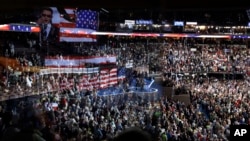Following President Joe Biden’s withdrawal from the presidential race, the Democratic Party’s focus has turned to its nominating convention, which will likely be the first open Democratic convention in decades.
Here is a look at how open conventions work, how the party chooses its nominee and what types of candidates are successful.
What is an open convention?
An “open” convention happens when there is no predetermined nominee at the start of a convention. At this year’s Democratic National Convention, delegates who were once bound to nominate Biden can cast their votes for any new candidate.
What are contested or brokered conventions?
“Contested” or “brokered” conventions are types of open conventions. While there is no official definition, most experts agree that a contested convention is one in which no candidate has secured a majority of delegates before the convention’s start. It can turn into a “brokered” or “multi-balloted” convention if no candidate wins the nomination on the first ballot.
When was the last multi-balloted convention?
The last conventions to fail to nominate a candidate on the first ballot were in 1952, with both Democrats and Republicans needing multiple ballots to nominate Adlai Stevenson and Dwight Eisenhower, respectively. Eisenhower won the general election.
When was the last contested convention?
The last time there was serious doubt about who a convention would nominate was in 1976, when Republican candidates Gerald Ford and Ronald Reagan both amassed a significant number of delegates in the primary elections, but neither won enough to secure the nomination outright. Ford went on to win the Republican nomination on the first ballot but would lose the general election to Democrat Jimmy Carter.
Are open conventions rare?
While open conventions in the modern era are relatively rare, they were the way political parties chose their presidential nominees throughout much of America’s history. “Brokered” conventions are called that because they often resulted from party leaders brokering the winner in backroom deals.
How did primaries change the conventions?
The introduction of the primary system in the early 1900s, in which states set up nominating contests, began to shift the way parties selected their nominees. However, primaries during the first half of the century were still secondary in importance to nominating conventions. Political leaders used the primaries to test the viability of possible candidates, but the conventions still determined the nomination outcome.
What changed in 1968?
The most significant change to the party convention system came from the 1968 Democratic convention in Chicago. Convention leaders chose Hubert Humphrey as the nominee despite Eugene McCarthy, an anti-war candidate, receiving more primary votes. The choice led to protests and violence outside the convention and political upheaval inside the hall. In the following years, both parties initiated reforms to ensure a majority of convention delegates were bound to the primary election outcomes.
What changed after the 2016 election?
Democrats further changed their rules after the 2016 election when many “superdelegates” — unpledged delegates who are party leaders — announced early support for Hillary Clinton, creating the perception that they were trying to influence the nominating contest against Bernie Sanders. Beginning in the 2020 election, the superdelegates were no longer allowed to vote in the first ballot at the convention, unless there was no doubt about the outcome of the contest.
What does the Constitution say about party conventions?
The U.S. Constitution does not mention parties or their nomination processes. However, the Supreme Court has recognized political parties as being covered by the “freedom of association” clause of the First Amendment. Over the years, courts have given political parties wide latitude on how they operate.
Who are the convention delegates?
The roughly 4,000 Democratic delegates have strong ties to their political party. They can include local party workers, union members, office holders and fundraisers. While voters cast ballots for delegate slots tied to presidential candidates, the delegates themselves are often not chosen until weeks or months after the primary vote.
Do the individual delegates matter?
If there is not a contested election, the identity of the individual delegates does not matter much to the average voter. The delegates will cheer at the convention and will formally nominate the party’s presidential candidate. However, in the case of a contested election, the delegates could matter a great deal with the freedom to back any candidate.
Who can delegates nominate?
“Pledged” delegates make up the majority of delegates — about 85% — and are pledged to back the candidate that voters elected. However, in the absence of that candidate, pledged delegates can back any nominee.
“Superdelegates” — who are leaders and elected officials in the Democratic Party — cannot vote on the first ballot in contested elections, but on subsequent ballots they can vote for any candidate they choose.
What candidates are successful?
History shows that nominees who prevail in contested conventions have a harder time winning the White House. A Pew Research study found that of the 60 Democratic and Republican nominating conventions from 1868 — the first post-Civil War election — to 1984, 18 candidates were nominated on multiple ballots. Of those, only seven — less than 40% — were elected president.




